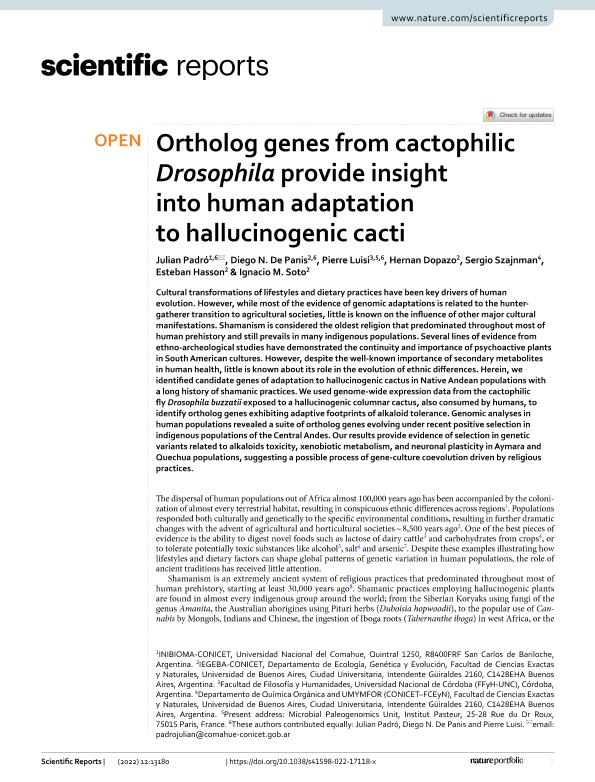Artículo
Ortholog genes from cactophilic Drosophila provide insight into human adaptation to hallucinogenic cacti
Padro, Julian ; de Panis, Diego Nicolás
; de Panis, Diego Nicolás ; Luisi, Pierre
; Luisi, Pierre ; Dopazo, Hernán Javier
; Dopazo, Hernán Javier ; Szajnman, Sergio Hernan
; Szajnman, Sergio Hernan ; Hasson, Esteban Ruben
; Hasson, Esteban Ruben ; Soto, Ignacio Maria
; Soto, Ignacio Maria
 ; de Panis, Diego Nicolás
; de Panis, Diego Nicolás ; Luisi, Pierre
; Luisi, Pierre ; Dopazo, Hernán Javier
; Dopazo, Hernán Javier ; Szajnman, Sergio Hernan
; Szajnman, Sergio Hernan ; Hasson, Esteban Ruben
; Hasson, Esteban Ruben ; Soto, Ignacio Maria
; Soto, Ignacio Maria
Fecha de publicación:
08/2022
Editorial:
Nature Publishing Group
Revista:
Scientific Reports
ISSN:
2045-2322
e-ISSN:
2045-2322
Idioma:
Inglés
Tipo de recurso:
Artículo publicado
Clasificación temática:
Resumen
Cultural transformations of lifestyles and dietary practices have been key drivers of human evolution. However, while most of the evidence of genomic adaptations is related to the hunter-gatherer transition to agricultural societies, little is known on the influence of other major cultural manifestations. Shamanism is considered the oldest religion that predominated throughout most of human prehistory and still prevails in many indigenous populations. Several lines of evidence from ethno-archeological studies have demonstrated the continuity and importance of psychoactive plants in South American cultures. However, despite the well-known importance of secondary metabolites in human health, little is known about its role in the evolution of ethnic differences. Herein, we identified candidate genes of adaptation to hallucinogenic cactus in Native Andean populations with a long history of shamanic practices. We used genome-wide expression data from the cactophilic fly Drosophila buzzatii exposed to a hallucinogenic columnar cactus, also consumed by humans, to identify ortholog genes exhibiting adaptive footprints of alkaloid tolerance. Genomic analyses in human populations revealed a suite of ortholog genes evolving under recent positive selection in indigenous populations of the Central Andes. Our results provide evidence of selection in genetic variants related to alkaloids toxicity, xenobiotic metabolism, and neuronal plasticity in Aymara and Quechua populations, suggesting a possible process of gene-culture coevolution driven by religious practices.
Archivos asociados
Licencia
Identificadores
Colecciones
Articulos(INIBIOMA)
Articulos de INST. DE INVEST.EN BIODIVERSIDAD Y MEDIOAMBIENTE
Articulos de INST. DE INVEST.EN BIODIVERSIDAD Y MEDIOAMBIENTE
Citación
Padro, Julian; de Panis, Diego Nicolás; Luisi, Pierre; Dopazo, Hernán Javier; Szajnman, Sergio Hernan; et al.; Ortholog genes from cactophilic Drosophila provide insight into human adaptation to hallucinogenic cacti; Nature Publishing Group; Scientific Reports; 12; 1; 8-2022; 1-15
Compartir
Altmétricas



